|
|
|
Sort Order |
|
|
|
Items / Page
|
|
|
|
|
|
|
| Srl | Item |
| 1 |
ID:
160419
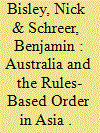

|
|
|
|
|
| Summary/Abstract |
In response to a more-contested Asia, Australia has placed the ‘rules-based order’ at the heart of its declaratory strategic policy. This move signals Australia’s commitment to this order, to its alliance with the United States, and to a more active strategic role in the region. However, a failure to match rhetoric with action risks undermining Australia’s strategic interests by emboldening China and reducing Australia’s value as an American ally.
|
|
|
|
|
|
|
|
|
|
|
|
|
|
|
|
| 2 |
ID:
146521
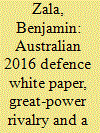

|
|
|
|
|
| Summary/Abstract |
This piece is an imagined email correspondence between three renowned international relations scholars, E. H. Carr, Hedley Bull and Coral Bell, who are discussing the Australian 2016 Defence White Paper. The purpose of such an exercise is to reflect on the ‘big-picture’ international relations questions posed by what might otherwise be thought of as a relatively technical defence policy document. In particular, the correspondence between the three focuses on the central importance of the White Paper’s assumptions of a ‘rules-based global order’ and the relationship between this order and US power. In their time, all three authors spoke directly to questions of power, law and order in their scholarly work, which had been deeply influenced, in all three cases, by periods spent working at the ‘coalface’ of these issues in government in Britain and Australia. As such, Carr, Bull and Bell have much to say about how Australia is positioning itself for a post-unipolar world.
|
|
|
|
|
|
|
|
|
|
|
|
|
|
|
|
| 3 |
ID:
165206
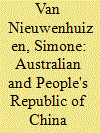

|
|
|
|
|
| Summary/Abstract |
Through qualitative comparative analysis of policy documents and official statements over the last 10 years (2008–2018), this paper examines Australian and PRC government conceptions of the international order and the associated policy implications. Their understandings of the international order are informed by their self-defined national role conceptions and perceptions of other states, and are manifested in discussions of institutional reform, international law and human rights. Australia's self-conception as a middle power informs its emphasis on maintenance and US leadership of the existing order, while the PRC's self-conceptions as both a developing and established power enable it to frame itself as either an upholder or reformer of the order. Both governments highlight the ‘rules-based’ mechanisms of the WTO, and are more likely to agree on trade and economic issues than on other matters. Their responses to the 2016 South China Sea arbitration tribunal decision and discussions of the role of human rights in the international order suggest less agreement is likely on international law and human rights norms. While Australia considers the PRC a potential challenger to the existing order, Australia does not feature in PRC discussions of international order, suggesting its limited ability to affect PRC foreign policy decisions.
|
|
|
|
|
|
|
|
|
|
|
|
|
|
|
|
| 4 |
ID:
189267


|
|
|
|
|
| Summary/Abstract |
Thirty years after the downfall of the Soviet-led communist bloc, the United States-led liberal international order is seen as coming to an end. Policymakers have converged on the need to safeguard the “rules-based order” across the newly coined “Indo-Pacific” region. However, policy and scholarly debates lack clarity about what exactly is to be preserved, and why the terms of the “rules-based order” and the “Indo-Pacific” have rapidly found their way into policy debates despite their contested meaning. Analyzing developments in regional multilateralism, we find that mainstream discourses purport static conceptions of order, which are often conflated with United States-centered trans-Pacific alliance relationships. The ensuing problem of order stems in large part from the fact that multilateral projects for building alternate orders, undertaken since the early 1990s, have remained far below their potential. We conclude that emerging forms of multilateral cooperation across the enlarged “Indo-Pacific” region have partially filled this void.
|
|
|
|
|
|
|
|
|
|
|
|
|
|
|
|
| 5 |
ID:
190365
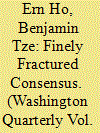

|
|
|
|
|
| Summary/Abstract |
Are international politics governed by power or by principles? The February 2022 invasion of Ukraine by Russia has raised the issue of whether might makes right in today’s world, or if there is a broader set of rules and principles which states ought to abide by, even when they might not agree with them. Following the end of the Second World War, the United States and the West forged what many call a rules-based international order, in which states conduct their activities.Footnote1 During the four decades of the Cold War, this Western-led order ran up directly against a communist-led order, of which the Soviet Union and China were the chief proponents. The end of the Cold War in 1991—symbolized by the razing of the Berlin Wall two years earlier—suggested that the Western world order had won out and was therefore superior to its communist competitor. The American political scientist Francis Fukuyama put forth his well-known “end of history” thesis concerning the inevitability of Western liberal democracy and the universalization of democratic values worldwide, anchored by an American-led international order—one which is more commonly known as the liberal international order.
|
|
|
|
|
|
|
|
|
|
|
|
|
|
|
|
| 6 |
ID:
184767
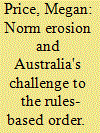

|
|
|
|
|
| Summary/Abstract |
Australian foreign policy makers increasingly place an emphasis on the importance of rules and norms. These foreign policy statements reflect concerns about China's growing assertiveness combined with the belief that a ‘thick’ anarchy is safer for middle powers. Yet while Australia has been fixated with how China poses a threat to the international order, at times, Australia has actively challenged that order itself. Such was the case when the Prime Minister gave an address on ‘negative globalism’ at the Lowy Institute in October 2019. This article advances a theoretically grounded framework for understanding how these performative challenges arise and come to cause norm erosion. The framework draws together three elements: the rule or norm in question; representational strategies; and domestic audiences. The article illustrates this framework using the example of the Prime Minister's Lowy Institute address.
|
|
|
|
|
|
|
|
|
|
|
|
|
|
|
|
| 7 |
ID:
181711
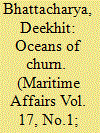

|
|
|
|
|
| Summary/Abstract |
Australia published a Strategic Update in 2020 to its 2016 Defence White Paper. The update represents a portentous shift in Australia’s understanding and response to its strategic environment. China’s increasingly belligerent stance, its use of grey-zone activities and an increasingly jittery United States have pushed Australia to actively seek robust anti-access/area denial (A2AD) capabilities. In addition, Australia intends to focus on its neighbourhood while shedding its anxieties regarding the Quad. The piece aims to briefly contextualise the ramifications of the update with its motivations. It also analyses Chinese behaviour on the world stage and argues for greater synergy in defence coordination between the Quad partners.
|
|
|
|
|
|
|
|
|
|
|
|
|
|
|
|
| 8 |
ID:
192482
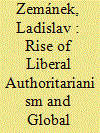

|
|
|
|
|
| Summary/Abstract |
The article deals with the transformation of the Western liberal democratic model
and international relations amid Cold War II. Sources of liberal authoritarianism
are identified, and the West’s ongoing authoritarian turn is conceptualized in
terms of postliberalism. The latter is scrutinized through the political West’s
efforts to protect liberal democracy and its values, and to establish global
Gemeinschaft of liberal democracies through containment, deterrence, and
encirclement. This process is seen as being interconnected with the intensifying
conflict between liberal and sovereign internationalism over the international
system. Whereas the political West asserts the rules-based order, the internally
heterogeneous Global Majority seeks to establish a polycentric model based
on the centrality of the UN Charter and the principles of peaceful coexistence.
Hegemonism is compared with the Global Majority’s emancipatory aspirations
that have led to the large-scale confrontation with the political West since 2022.
|
|
|
|
|
|
|
|
|
|
|
|
|
|
|
|
| 9 |
ID:
192520
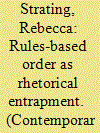

|
|
|
|
|
| Summary/Abstract |
In response to challenges to Asia’s security order, regional powers such Australia, India, and Japan have adopted new “Indo-Pacific” strategic narratives to promote and defend the “rules-based order.” These narratives use China’s maritime disputes with smaller neighbors in the South China Sea as a key example of Beijing’s revisionist intentions. Yet such narratives expose “rules-based order” advocates to risks of “rhetorical entrapment” as other actors compel them to abide by the standards they have set. To what extent have Indo-Pacific powers been forced to follow the rules in their own asymmetrical maritime disputes? This article examines three Indo-Pacific cases: Timor Sea Compulsory Conciliation between Australia and Timor-Leste, the Chagos Island Marine Protected Area Arbitration between the United Kingdom and Mauritius, and the Bay of Bengal Maritime Boundary Arbitration between India and Bangladesh. To varying degrees, this article finds that strategic narratives constrained the policy options of all three Indo-Pacific powers.
|
|
|
|
|
|
|
|
|
|
|
|
|
|
|
|
| 10 |
ID:
151994
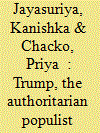

|
|
|
|
|
| Summary/Abstract |
In this short article, the authors analyse the implications of the election of Donald Trump for the future of the liberal rules-based order, with specific emphasis on its implications for the Asian region. Departing from the institutional fetishism that figures prominently in the literature, the authors argue that this liberal order needs to be conceptualised in terms of its social foundations. Particularly important to consider, in terms of understanding these social foundations, is the nature of social relations in the USA. The election of Trump reflects the deep crisis of the US state and the rise of a new ‘authoritarian populism’. The authors trace the roots of this authoritarian populism to patterns of global capitalist transformation, the crisis of the US state and the modes of crisis management that this has generated. They then explore the implications of Trump’s authoritarian populism for the region.
|
|
|
|
|
|
|
|
|
|
|
|
|
|
|
|
|
|
|
|
|